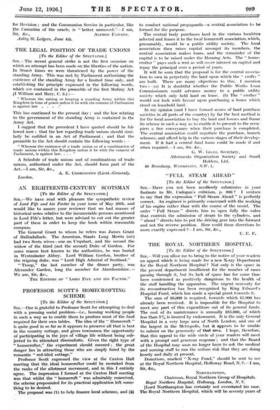PROFESSOR SCOTT'S HOMECROFTING SCHEME [To the Editor of the SPECTATOR.]
Sia—One is grateful to Professor Scott for attempting to deal with a pressing social problem—i.e., housing working people in such a way as to enable them to produce most of the food required for their own tables. The idea of the" Homecroft " is quite good in so far as it appears to preserve all that is best in the country cottage, and gives townsmen the opportunity of participating in the joys of village life without being sub- jected to its attendant discomforts. Given the right type of " homecrofter," the experiment should succeed ; _ the great danger lies in attracting those who are simply lured by the romantic "red-tiled cottage."
Professor Scott expressed the ,view at the Caxton Hall meeting that the, ideal homecrofter could be recruited from the ranks of the allotment movement, and in this I entirely agree. The impression I formed at the Caxton Hall meeting was that whilst the " homecroft " was admirably conceived, the scheme propounded for its practical application left some- thing to be desired.
The proposal was (1) to .help finance local schemes, and (2) to conduct national propaganda—a central association to be formed for the purpose.
The central body purchases land in the various localities selected and leases it to the local homecroft association, which, presumably, would be a public utility society. The local association then raises capital amongst its members, the central association makes loans, and the remainder of the capital is to be raised under the Housing Acts. The " home- crofter " pays such a rent as will cover interest on capital and repay the principal over a period of years.
It will be seen that the proposal is for the central associa- tion to own in perpetuity the land upon which the "crofts" are built. There are many objections to this. I mention two :--(a) It is doubtful whether the Public Works Loan Commissioners could advance money to a public utility society which only held land on lease. (b) The " crofter " would not look with favour upon purchasing a house which stood on leasehold land.
In my opinion (and I have formed scores of land purchase societies in all parts of the country) by far the best method is for' the local association to buy the land and houses and frame its scheme in such a way as to enable it to present to the occu- piers a free conveyance when their purchase is completed. The central association could negotiate the purchase, launch schemes, and afford help in the various stages of their develop- ment. If it had a central fund loans could be made if and when required.--I am, Sir, &c.,
G. W. GILES, Secretary,
Allotments Organization Society and Small Holders, Ltd.
44) Broadway, Westminster, S.W .1.






















































 Previous page
Previous page